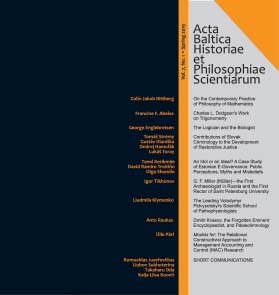G. F. Miller (Müller)—the First Archaeologist in Russia and the First Rector of Saint Petersburg University
G. F. Miller (Müller)—the First Archaeologist in Russia and the First Rector of Saint Petersburg University
Author(s): Igor L. TikhonovSubject(s): Archaeology, Higher Education , History of Education
Published by: Tallinna Tehnikaülikooli õiguse instituut
Keywords: archaeology; Miller (Müller); rector; Siberia; St. Petersburg University;
Summary/Abstract: Gerhard Friedrich Miller (Müller) was a graduate of the University of Leipzig. In November 1725 he arrived in Russia, where he spent the rest of his life—first as an adjunct, then as a professor and a conference secretary of the Academy of Sciences. Since 1732 he published Sammlung Russischer Geschichte—the first Russian periodical publication on history. During a decade-long expedition to Southern Siberia, Miller worked out instructions for the study of archaeological sites and the classification of barrows. Miller was one of the first to realize the historical significance of archaeological sites and claimed that the main goal in the study of antiquities is to explain the ancient history of the inhabitants of the territory. Miller’s activity was connected with the formation of a truly scientific approach to the antiquities. He was the first to write scientific works in Russian specifically devoted to the antiquities, which makes him the first Russian archaeologist. In 1747, the President of St. Petersburg Academy of Sciences appointed Miller rector of the university. As a rector, he composed a catalogue of lectures, introduced required additional training in geography and arithmetic, and promoted teaching of foreign languages (French and German). For teaching the German language, he invited his brother to Russia. He made up chronological tables on history for students. Besides that, Miller prepared a draft of the new university regulations “following the example of European universities”. The project provided autonomy, the right to award academic degrees and improved the social status of professors. However, this draft was not adopted. Miller was serious about his responsibilities and took care of the students, trying to supply them with the necessary books and teaching aids, and incentives for the best students. He paid much attention to students’ discipline and developed a system of penalties for misconduct. Most of the students who graduated the University at that time were left to work at the Academy of Sciences. In 1750, Miller was dismissed from the post of the rector. One of the reasons was his conflict with M. V. Lomonosov and the director of the Academy, G. N. Teplov.
Journal: Acta Baltica Historiae et Philosophiae Scientiarum
- Issue Year: 7/2019
- Issue No: 1
- Page Range: 81-96
- Page Count: 16
- Language: English

